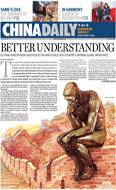Economy
India lifts key interest rates by 0.5%
Updated: 2011-05-03 16:17
(Xinhua)
MUMBAI - Indian central bank Reserve Bank of India decided to raise key interest rates by 0.5 percent Tuesday to contain persistent high inflation, according to its latest monetary policy statement.
The repo rate at which commercial banks borrow money from RBI to be 7.25 percent and the reverse repo rate at which commercial banks park money with RBI will 6.25 percent after the upward adjustment.
The marks the 9th upward adjustment of key interest rates in India since March 2010 and indicates the aggressiveness of RBI facing stubborn inflation pressures.
Meanwhile, RBI hiked to saving bank deposit interest rate to 4 percent from 3.5 percent in a bid to arrow the difference between savings bank deposit interest rate and term deposit rate.
RBI forecasted that Indian inflation will remain close to the March 2011 level of 9 percent over the first half of fiscal year 2011-2012 starting from March 1, 2011.
RBI will continue to persevere with its anti-inflationary stance while the persistence of inflation over the next few months has been incorporated in this policy, said the statement.
Current elevated inflation pose significant risks to future growth and bringing inflation down shall take precedence even at the cost of some growth in the short-run, said the central bank.
This means Indian central bank has chosen to sacrifice some short-term economic growth in return for the sustained growth in the medium term.
RBI also predicted that Indian economy will grow around 8 percent in fiscal year 2011-2012 with adverse impact from high oil and other commodity prices and anti-inflationary measures.
Baseline inflation projection for wholesale price index will be 6 percent with upward bias by March 2012 and the inflation is expected to remain at an elevated level in the first half of current fiscal year, said the monetary policy.
Plus, RBI abandoned the dual-interest-rates system including repo and reverse repo rates and set repo rate as the only one independently varying policy rate.
Meanwhile, reverse repo rate and Marginal Standing Facility (MSF) are linked with repo rate, 1 percent lower and higher from the latter, respectively.
Commercial banks could borrow overnight via MSF up to 1 percent of their respective net demand and time liabilities.
High global crude oil and other commodity prices pose the biggest risk to India's growth and inflation, said a report by RBI one day ahead of the monetary policy.
E-paper

Head on
Chinese household care goods producers eye big cities, once stronghold of multinational players
Carving out a spot
Back onto center stage
The Chinese recipe
Specials

British Royal Wedding
Full coverage of the royal wedding of Prince William and Kate Middleton in London. Best wishes

The final frontier
Xinjiang is a mysterious land of extremes that never falls to fascinate.

Bridging the gap
Tsinghua University attracts a cohort of foreign students wanting to come to China.
